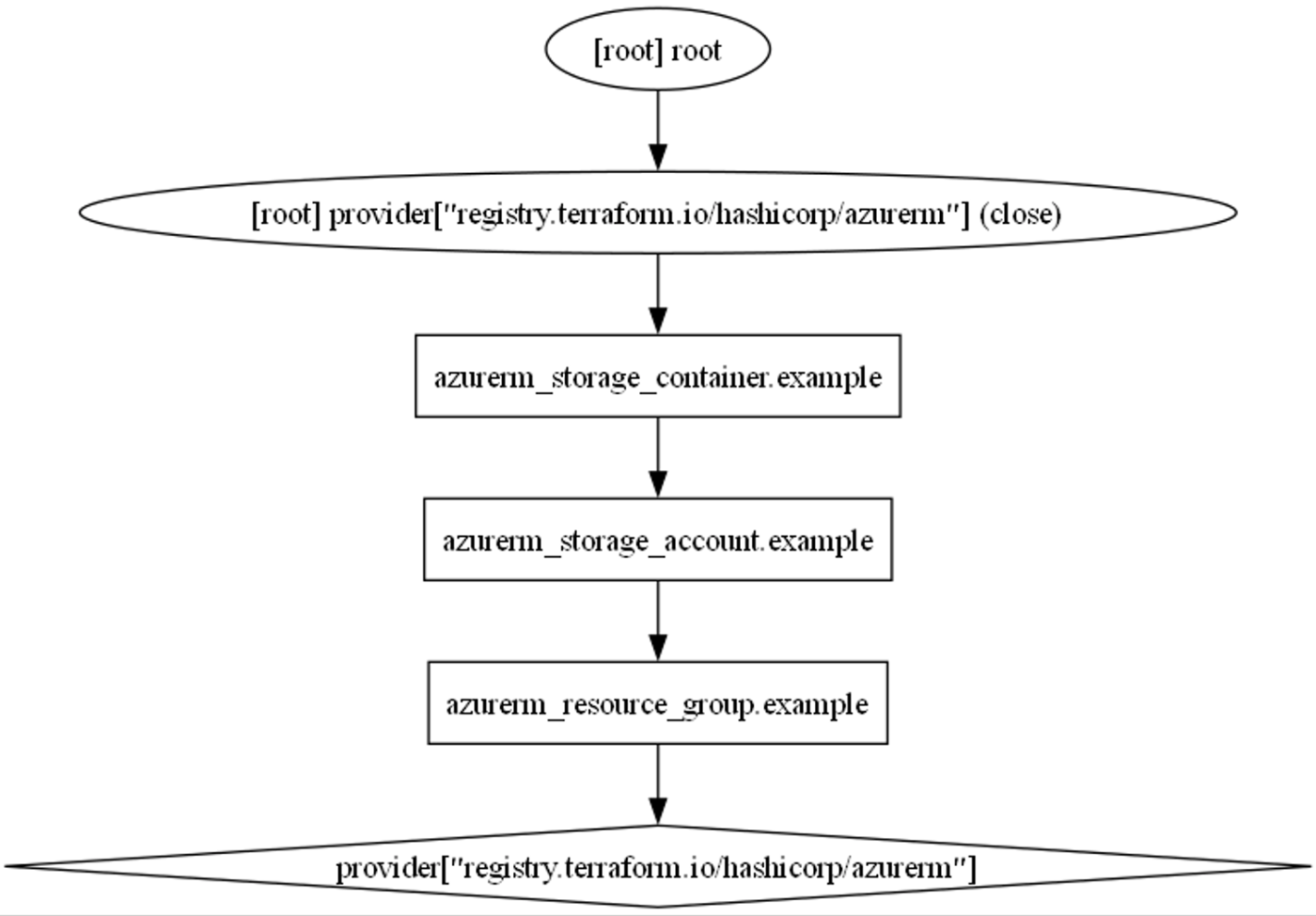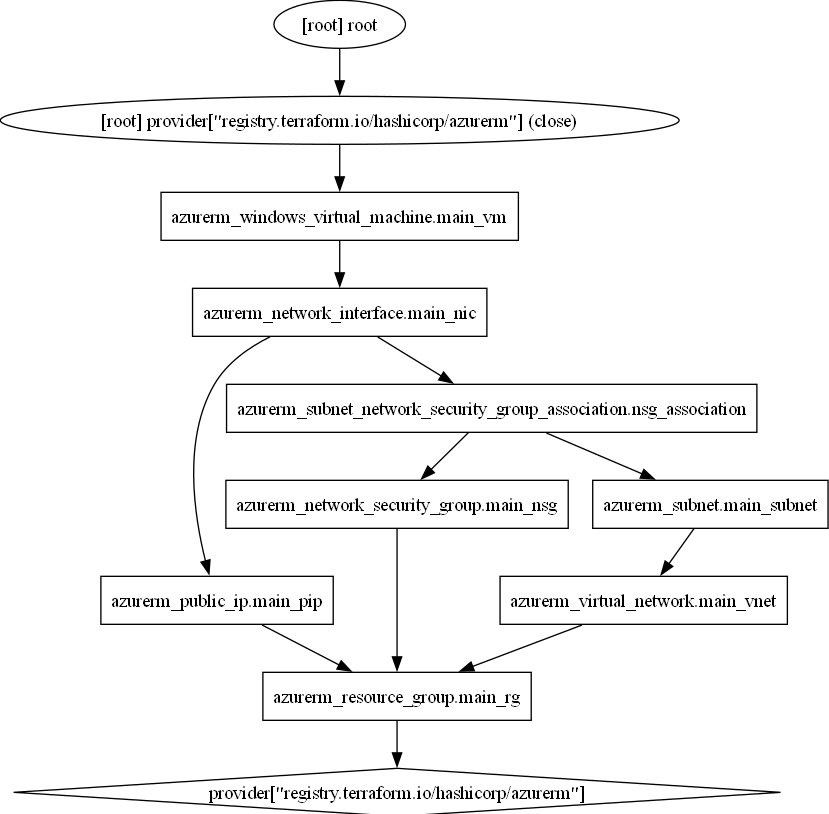✨
【Terraform】Terraform graphで依存関係を可視化してみる
執筆日
2025/5/1
やること
TerraformやBicepなどのIaCツールを用いて、Azure環境の構築をよく行っています。Terraformのドキュメントを確認していると、terraform graph という気になるコマンドを発見しました。今回は、このコマンドの役割や使い方について検証しました。
結論
terraform graph は、Terraformで定義したリソース間の依存関係をグラフ形式で出力するためのコマンドです。
準備
- Graphvizをインストール済みであること
実行手順
以下のコマンドで依存関係を視覚的に確認できます。
terraform init
terraform graph | dot -Tpng > dependency_graph.png
これで生成されたPNG画像を通じて、リソース間の依存関係が一目で確認できます。
サンプル
サンプル①
main.tf
terraform {
required_providers {
azurerm = {
source = "hashicorp/azurerm"
version = "~> 3.0"
}
}
}
provider "azurerm" {
features {}
}
# Resource Groupの作成
resource "azurerm_resource_group" "example" {
name = "example-rg"
location = "Japan East"
}
# ストレージアカウントの作成
resource "azurerm_storage_account" "example" {
name = "examplestorageacct01"
resource_group_name = azurerm_resource_group.example.name
location = azurerm_resource_group.example.location
account_tier = "Standard"
account_replication_type = "LRS"
}
# Blobコンテナの作成
resource "azurerm_storage_container" "example" {
name = "example-container"
storage_account_name = azurerm_storage_account.example.name
container_access_type = "private"
}
リソースグループ>Blob Storage>コンテナーで依存関係が表示されている。

サンプル②
次のような依存関係を意図的に作成します:
- Resource Group(親リソース)
- 仮想ネットワーク(VNet)(Resource Groupに依存)
- サブネット(VNetに依存)
- ネットワークセキュリティグループ(NSG)(サブネットに依存)
- パブリックIPアドレス(Resource Groupに依存)
- ネットワークインターフェース(NIC)(NSG, サブネット, パブリックIPに依存)
- 仮想マシン(VM)(NICに明示的に依存指定)
main.tf
terraform {
required_providers {
azurerm = {
source = "hashicorp/azurerm"
version = "~> 3.0"
}
}
}
provider "azurerm" {
features {}
}
# Resource Group作成
resource "azurerm_resource_group" "main_rg" {
name = "complex-rg"
location = "Japan East"
}
# 仮想ネットワーク(VNet)
resource "azurerm_virtual_network" "main_vnet" {
name = "complex-vnet"
resource_group_name = azurerm_resource_group.main_rg.name
location = azurerm_resource_group.main_rg.location
address_space = ["10.0.0.0/16"]
}
# サブネット
resource "azurerm_subnet" "main_subnet" {
name = "complex-subnet"
resource_group_name = azurerm_resource_group.main_rg.name
virtual_network_name = azurerm_virtual_network.main_vnet.name
address_prefixes = ["10.0.1.0/24"]
}
# ネットワークセキュリティグループ(NSG)
resource "azurerm_network_security_group" "main_nsg" {
name = "complex-nsg"
resource_group_name = azurerm_resource_group.main_rg.name
location = azurerm_resource_group.main_rg.location
}
# NSGとサブネットの関連付け
resource "azurerm_subnet_network_security_group_association" "nsg_association" {
subnet_id = azurerm_subnet.main_subnet.id
network_security_group_id = azurerm_network_security_group.main_nsg.id
depends_on = [
azurerm_subnet.main_subnet,
azurerm_network_security_group.main_nsg
]
}
# パブリックIPアドレス
resource "azurerm_public_ip" "main_pip" {
name = "complex-pip"
resource_group_name = azurerm_resource_group.main_rg.name
location = azurerm_resource_group.main_rg.location
allocation_method = "Dynamic"
}
# ネットワークインターフェース(NIC)
resource "azurerm_network_interface" "main_nic" {
name = "complex-nic"
resource_group_name = azurerm_resource_group.main_rg.name
location = azurerm_resource_group.main_rg.location
ip_configuration {
name = "internal"
subnet_id = azurerm_subnet.main_subnet.id
private_ip_address_allocation = "Dynamic"
public_ip_address_id = azurerm_public_ip.main_pip.id
}
depends_on = [
azurerm_subnet_network_security_group_association.nsg_association,
azurerm_public_ip.main_pip
]
}
# 仮想マシン(VM)
resource "azurerm_windows_virtual_machine" "main_vm" {
name = "complex-vm"
resource_group_name = azurerm_resource_group.main_rg.name
location = azurerm_resource_group.main_rg.location
size = "Standard_DS1_v2"
admin_username = "azureuser"
admin_password = "ComplexP@ssword1234"
network_interface_ids = [
azurerm_network_interface.main_nic.id
]
os_disk {
caching = "ReadWrite"
storage_account_type = "Standard_LRS"
}
source_image_reference {
publisher = "MicrosoftWindowsServer"
offer = "WindowsServer"
sku = "2019-Datacenter"
version = "latest"
}
depends_on = [
azurerm_network_interface.main_nic
]
}

Discussion